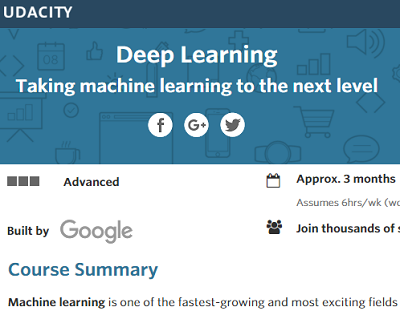 by Angela Guess
by Angela Guess
Jordan Novet reports in VentureBeat, “Google today announced that it’s bringing a deep learning course to massively open online course (MOOC) provider Udacity. Deep learning is an increasingly popular type of artificial intelligence. Generally speaking, it involves training artificial neural networks on lots of data — like pictures — and then getting them to make inferences about new data based on what they know. Vincent Vanhoucke, a Google principal scientist and a technical lead on the Google Brain team, is teaching the course, which is part of Udacity’s machine learning engineer Nanodegree program. The Google Brain team advances the company’s core deep learning technology, which can be used inside of many Google products.”
Novet continues, “Indeed, Google uses deep learning in many of its applications, including Google Voice Search, Inbox by Gmail, Google Photos, and Google Translate. In November, Google open-sourced TensorFlow, a powerful piece of deep learning software from the Google Brain team. And sure enough, the Udacity course will cover TensorFlow, as well as convolutional neural networks, recurrent neural networks, and long short term memory networks, Vanhoucke wrote in a blog post on the news. ‘Our overall goal in designing this course was to provide the machine learning enthusiast a rapid and direct path to solving real and interesting problems with deep learning techniques, and we’re now very excited to share what we’ve built!’ Vanhoucke wrote. The course itself is free — just like the TensorFlow software.”
photo credit: Udacity